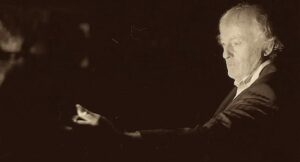
- This event has passed.
Contemporary poets respond to the Holocaust
January 28, 2025 @ 7:00 pm – 10:00 pm EST
AFTER: Poetry Destroys Silence: Screening followed by Q+A with producer and poet Janet R. Kirchheimer, poet and actor Géza Röhrig, and poet Edward Hirsch, moderated by Eva Fogelman. Tue, Jan 28, 7 pm, Marlene Meyerson JCC Manhattan (L2 Auditorium). $18
AFTER: Poetry Destroys Silence is a deep dive into the creative responsibility of writers when faced with holocaust, catastrophe and genocide. Do they bury their heads in the sand or do they reach out to the world with their creative gift?
The first of its kind, where poetry and cinema combine and transcend, AFTER is an exploration of poetry written about the Shoah. Contemporary poets respond to the Holocaust and talk about the importance and necessity for poetry in a world that still grapples with genocide. Weaving a narrative, each poem has its own story, main character(s), and point of view, each acting as a short island with the entire film. AFTER also interlaces sequences of music, archival footage, personal photographs, and documents. The power of the words, performances, commentary, cinematic interpretations, sounds, and silences bring the poems to life on screen, offering a modern chronicle of poets examining history and the current day.

Director Richard Kroehling is a multidisciplinary artist, film director, multi-media maker, painter and poet. At university Kroehling was a student of iconic Hollywood director Nick Ray and avant-garde Austrian cinema artist Peter Kubelka, Kroehling’s works include feature films, mainstream television, non-fiction, video art, photography, poetry and installation media art.
See also: Nell Minow. After: Poetry Destroys Silence. 1 Nov 2024. RogerEbert.com
The poet Alicia Suskin Ostriker tells us what only poetry can do: “Poetry goes below the surface….in a way that journalism and academic language can never do. Poetry is what poets do with trauma.” She explains that the economy of poetry, the very aspect that can initially seem obscure, invites us to engage. “What is not said is just as important because it pulls the audience in and makes them be co-creators of the poem.” In the same way, this film immerses us and makes us participants in sharing the poets’ words.